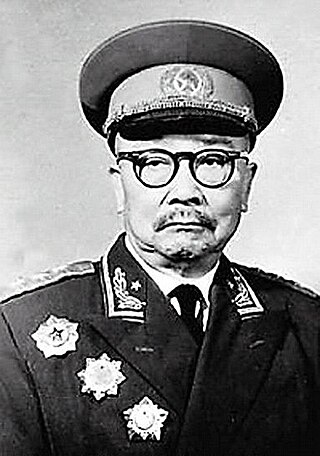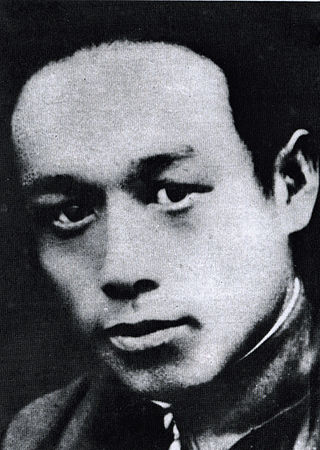| |||||
| Decades: | |||||
|---|---|---|---|---|---|
| See also: | Other events of 1896 History of China • Timeline • Years | ||||
Events in the year 1896 in China .
| |||||
| Decades: | |||||
|---|---|---|---|---|---|
| See also: | Other events of 1896 History of China • Timeline • Years | ||||
Events in the year 1896 in China .

Zhou Enlai was a Chinese statesman, diplomat, and revolutionary who served as the inaugural premier of the People's Republic of China (PRC) from 1949 until his death in 1976, and concurrently as the inaugural Minister of Foreign Affairs from 1949 to 1958. Zhou was a key figure in the Chinese Communist Party (CCP) and ally of Mao Zedong during the Chinese Civil War, later helping consolidate its control, form its foreign policy, and develop the economy.

Chen Yun was a Chinese revolutionary leader who was one of the most influential leaders of the People's Republic of China during the 1980s and 1990s and one of the major architects and important policy makers for the reform and opening up period, alongside Deng Xiaoping. He was also known as Liao Chenyun (廖陈云), as he took his uncle's family name when he was adopted by him after his parents died.

Xu Xiangqian was a Marshal of the People's Republic of China (PRC). He was the son of a wealthy landowner, but joined the Kuomintang's (KMT) National Revolutionary Army (NRA), against his parents' wishes, in 1924. When the Chinese Civil War started in 1927, Xu joined the Eyuwan Soviet led by Zhang Guotao; Xu became commander of the Eyuwan-based Fourth Red Army. Zhang and Xu retreated to northern Sichuan after being defeated by a KMT encirclement campaign. Xu politically survived Zhang's defection to the KMT in the late-1930s; he rejoined the Red Army in a less senior position under the leadership of Mao Zedong.
The 28 Bolsheviks were a faction in the early Chinese Communist Party (CCP). The faction was formed among Chinese Communists studying at the Sun Yat-sen University in Moscow during the late 1920s and early 1930s. They received their nickname because of their strong support for the orthodox political positions advocated by Joseph Stalin and Pavel Mif. The leaders of the faction included Wang Ming, Bo Gu, Luo Fu, He Zishu, Wang Jiaxiang, and Shen Zemin. Sun Yat-sen University closed in 1930 and the students made their way back to China.

Zhang Wentian was a Chinese politician who was a high-ranking leader of the Chinese Communist Party (CCP).

Gu Zhun was a Chinese intellectual, economist and pioneer of post-Marxist Chinese liberalism. A victim of "anti-Rightist" purges, he spent his later life in prisons and reeducation centres.

Li Kenong was a Chinese general and politician, one of the creators of the security and intelligence apparatus of both the Chinese Communist Party (CCP) and the People's Liberation Army. Notably, he served as Director of the Central Investigation Department, Deputy Chief of the PLA General Staff Department and Deputy Minister of Foreign Affairs and was awarded the rank of General in 1955.
Events in the year 1949 in China.
Events in the year 1946 in the Republic of China. This year is numbered Minguo 35 according to the official Republic of China calendar.
Events in the year 1955 in China. The country had an estimated population of 605 million people.
Events in the year 1956 in China. The country had an estimated population of 620 million people.

Gu Mu (Chinese: 谷牧; pinyin: Gǔ Mù; Wade–Giles: Ku3 Mu4; September 1914 – November 6, 2009) was a Chinese revolutionary figure and politician, who served as the Vice Premier of China between 1975 and 1982. As one of Deng Xiaoping's main aides in charge of economic management, he played a major role in implementing Deng's economic reform policies of the 1980s. He was a key figure in the creation of Shenzhen, China's first Special Economic Zone.
The following lists events in the year 1988 in China.
The following lists events that happened during 1984 in the People's Republic of China.
The following lists events in the year 1991 in China.

The 1st National Congress of the Chinese Communist Party was held in Shanghai and Jiaxing between July 23 and August 2, 1921. The Congress established the Chinese Communist Party (CCP). The congress began in a shikumen building of the French Concession area of Shanghai. In early June 1921, Dutch national Henk Sneevliet, also known as Ma Lin, a representative of Comintern, arrived in Shanghai, and urged various Communist cells in the country to get together for a national-level meeting. Russian Comintern representative Nikolski also attended the meeting. At the time, there were 57 members of the CCP. Notably, the two founders of the party did not attend the congress: Chen Duxiu and Li Dazhao.
Events from the year 1969 in China.
Events from the year 1987 in China.
Events from the year 1966 in China.